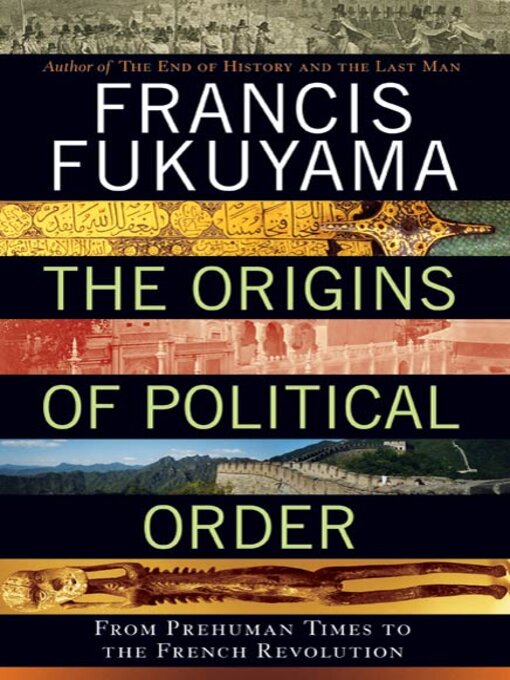A landmark history of the origins of modern democratic societies by one of our most important political thinkers.
A New York Times Notable Book for 2011
A Globe and Mail Best Books of the Year 2011 Title
A Kirkus Reviews Best Nonfiction of 2011 title
Virtually all human societies were once organized tribally, yet over time most developed new political institutions which included a central state that could keep the peace and uniform laws that applied to all citizens. Some went on to create governments that were accountable to their constituents. We take these institutions for granted, but they are absent or are unable to perform in many of today's developing countries—with often disastrous consequences for the rest of the world.
Francis Fukuyama, author of the bestselling The End of History and the Last Man and one of our most important political thinkers, provides a sweeping account of how today's basic political institutions developed. The first of a major two-volume work, The Origins of Political Order begins with politics among our primate ancestors and follows the story through the emergence of tribal societies, the growth of the first modern state in China, the beginning of the rule of law in India and the Middle East, and the development of political accountability in Europe up until the eve of the French Revolution.
Drawing on a vast body of knowledge—history, evolutionary biology, archaeology, and economics—Fukuyama has produced a brilliant, provocative work that offers fresh insights on the origins of democratic societies and raises essential questions about the nature of politics and its discontents.
- Everyone Reads: Social Emotional Learning
- Lonely Planet Travel Guides
- Spotlight on: Mental Health
- Deaf Culture, Experience, and History
- Autism Awareness
- Employment and Career Resources
- Black Lives Matter - Books for Young People
- Celebrate National Native American Heritage
- Latinx Authors
- Anti-Racist Reading
- Schomburg Center Black Liberation Reading List
- Books to Battle Quarantine Sleep Problems
- Never, Never, Never Give Up
- See all useful topics collections
- eBooks with no wait lists!
- eBooks: Best 2022 Adult Fiction Titles
- Most popular
- Just Added
- Books in Spanish/Libros en Español
- SciFi Old & New, Contemporary & Classic
- Read-Along Books
- Popular Mysteries
- Try something different
- Why Wait? Always Available Classics
- Comics and Graphic Novels
- Escape into History: Historical fiction
- Manga for Grownups
- See all ebooks collections
- Always Available Audio
- It's Your Lucky Day! Audiobooks+
- eAudio: Best 2022 Adult Fiction Titles
- Modern Scholar Audiobooks - NO WAITING!
- Legacy Washington Audio Collection - Listen NOW!
- Most popular
- Just Added
- Spanish/Audiolibros en Español
- Stranger than Fiction
- Try something different
- Family Road Trip Audiobooks
- You can't hit pause on these thrillers
- Best Audiobooks under 3 Hours
- See all audiobooks collections
- 2023 Washington State Book Award Finalists (WSBA)
- Best of 2022: Adult Nonfiction
- Now's Your Chance!
- En español - lo nuestro
- Microhistories - Get down in the weeds with these intriguing titles!
- D-Day, June 6, 1944
- Unreliable Narrators
- Bibliotherapy
- Steampunk
- Dealing with Addiction
- Historical Fiction
- Presidents and Politics
- Laughing all the way to the bank
- See all eyes and ears collections


